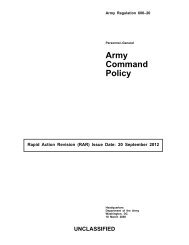Patient Administration - Army Publishing Directorate - U.S. Army
Patient Administration - Army Publishing Directorate - U.S. Army
Patient Administration - Army Publishing Directorate - U.S. Army
Create successful ePaper yourself
Turn your PDF publications into a flip-book with our unique Google optimized e-Paper software.
on the patient’s behalf. Except for emergencies, when a patient for some reason other than a judicial determination of<br />
mental incompetency is unable to consent, consent must be obtained from the person whom local law determines is<br />
authorized to consent on the patient’s behalf. When a judicial determination of mental incompetency has been made,<br />
consent must be obtained from the person whom the court appoints to act for the incompetent patient. In the absence of<br />
any governing State law provision regarding surrogate consent, the consent of the spouse or next of kin is required.<br />
Questions concerning consent requirements or authority to consent will be referred to the servicing Staff Judge<br />
Advocate (SJA) or legal advisor.<br />
c. Form of consent. Consent may be either express or implied.<br />
(1) Implied consent. Implied consent may be inferred from actions of the patient, or other circumstances, even<br />
though specific words of consent are not used. For example, a patient’s application for admission to an MTF is implied<br />
consent to hospitalization. If the patient is a minor incapable of giving consent, implied consent of the parent or<br />
guardian may be found in actions of the parent or guardian requesting or not objecting to medical care for the minor.<br />
Moreover, consent to treatment is implied in certain emergency situations when patients are incapable of giving or<br />
denying consent and their condition represents a serious or imminent threat to life, health, or well-being.<br />
(2) Express consent. Express consent involves a statement of consent to proposed medical care made by the patient<br />
or person authorized to act on the patient’s behalf. Express consent may be valid whether it is oral or in writing.<br />
However, written consent must be obtained for both inpatients and outpatients before performing the procedures<br />
outlined in d below.<br />
(3) OF 522 (Medical Record—Request for <strong>Administration</strong> of Anesthesia and Performance of Operations and Other<br />
Procedures). This form will be used to record express written consents. (See d and e below.) Keep a record to<br />
document consent when there are local legal consent requirements that cannot be adequately captured on OF 522.<br />
(4) DA Form 4359-R (Authorization for Psychiatric Service Treatment). This form will be used for admission of<br />
patients to psychiatric treatment units. In such cases, OF 522 will also be completed.<br />
d. Procedures requiring written consent. Requests for the procedures in (1) through (7), below, must be recorded on<br />
OF 522. (In the case of dental care, one OF 522 may be used to record a complete course of treatment, as appropriate.)<br />
Any questions about the necessity or advisability of a written consent should be resolved in favor of obtaining a written<br />
consent.<br />
(1) All surgery involving entry into the body by an incision or through one of the natural body openings.<br />
(2) Any procedure or course of treatment in which anesthesia is used, whether or not entry into the body is<br />
involved. This includes dental procedures involving the use of either general anesthetic, intravenous sedation, or nitrous<br />
oxide sedation.<br />
(3) All nonoperative procedures that involve more than a slight risk of harm to the patient or that involve the risk of<br />
a change in body structure.<br />
(4) All procedures in which x-ray, radiation, or other radioactive substance is used in the patient’s treatment.<br />
(5) All procedures that involve electroshock therapy.<br />
(6) All transfusions of blood or blood products.<br />
(7) All other procedures that, in the opinion of the attending physician, dentist, chief of service, clinic chief, or the<br />
commander, require a written consent.<br />
e. Counseling before obtaining consent. The physician, dentist, or other health care provider/practitioner who is to<br />
perform or supervise the procedure will counsel the patient or the consenting person as appropriate to provide the basis<br />
for an informed consent. (See legal requirements in f below.) In written consents, any exceptions to surgery or other<br />
procedures made by the consenting person will be recorded by the health care provider/practitioner on OF 522. When<br />
all the data in Parts A and B of OF 522 are completed, the counseling must be attested to by signatures of the<br />
counseling health care provider/practitioner and the consenting person in Part C of OF 522.<br />
f. Sufficiency of consent. The consenting person must be legally capable of giving consent and must understand the<br />
nature of the procedure, the attendant risks, expected results, possible alternative methods of treatment, and the<br />
prognosis if treatment is not given. Legality of consent is determined by the law of the State in which the facility is<br />
located, unless preempted by Federal law or as modified in overseas locations.<br />
g. Nonmilitary minors. The sufficiency of consent by a nonmilitary minor to medical or dental examinations or<br />
treatment will be determined under the same criteria as provided in f above. Most States have laws concerning consent<br />
by minors. Many States allow the treatment of venereal disease and certain other conditions with the consent of the<br />
minor alone, without parental knowledge or consent. If no law exists on the subject or if the law does not specifically<br />
prohibit consent by a minor, the maturity of the minor should dictate whether he or she may give a legally sufficient<br />
consent. The health care provider/practitioner obtaining the consent will determine the maturity of the minor. The<br />
minor’s age, level of intelligence, and the minor’s understanding of the complications and seriousness of the proposed<br />
treatment are all factors to consider when determining the maturity of the minor. When the minor’s consent alone is<br />
legally sufficient, the minor’s decision to authorize or reject the proposed treatment is binding. Even when the minor’s<br />
consent alone is not legally sufficient, his or her consent should be obtained along with the parent’s consent whenever<br />
the minor is able to understand the significance of the proposed procedures. If there is a question as to the sufficiency<br />
of the minor’s consent, the servicing SJA or legal advisor will be consulted.<br />
4 AR 40–400 27 January 2010
















